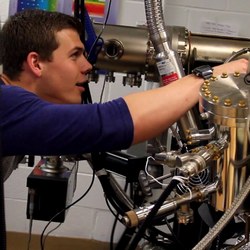Mike Jaris
Major: Physics and Electrical Engineering
“As a graduating senior I have spoken with many students, universities, and employers about prospective work (graduate school, industry, etc.) and can confidently say that the dual degree in physics and electrical engineering has given me opportunities that would have never been possible otherwise. Employers and schools love people with a strong physics background because they have the ability to learn and understand almost anything. Many of my friends are jealous of my double major now because they have seen just how much it has helped me. I highly recommend it to any student who wants to excel.”
Why did you choose to major in physics?
“When I was a sophomore I had serious scheduling issues and was not going to be able to complete my electrical engineering degree in 4 years taking only electrical and computer engineering (ECE) courses. The problem was that many courses in this field build on introductory courses and these classes had a time conflict (this is a common problem), so I was unable to enroll in the primary classes or the upper level ECE elective courses that I needed to fulfill the requirements for the degree. However, there were courses outside of ECE that satisfied the elective requirements so I chose to enroll in two upper level physics classes in order to stay on track. I was thoroughly enjoying the coursework (because physics is fun!) and eventually found out that it was possible to complete a double major in electrical engineering and physics, which seemed like an obvious decision. I ultimately chose to pursue both degrees because it seemed like a win/win, physics was strengthening my understanding of processes learned in engineering and it also was a great resume builder. I would argue a student is doing a disservice to themselves if they don’t at least give thought to doing this.”
How did physics help with your engineering courses?
“Understanding the physics behind devices is vital for anyone who aspires to master their craft and fully understand the complex mechanisms that modern technology takes advantage of. By thoroughly understanding sciences such as thermodynamics, electromagnetic fields, quantum mechanics, classical dynamics, and many others you provide yourself a skill set that allows you to comprehend the theory behind the applications studied in electrical engineering. Not only this, but these classes bolster your mathematical abilities by teaching you a variety of techniques which is always advantageous for engineering – especially electrical engineering which is arguably the most math intensive of any field of engineering. And many times it turned out that I learned things in physics and was able to “reuse” it in engineering and it ultimately saved me time and headache!”
How easy/hard is it to pursue both degrees?
“I would be lying to say that it’s easy, but if you want easy then neither of these fields will be very enjoyable for you. The workload is not light, but that does not necessarily mean it’s hard. In most cases, it offered an alternate perspective on everything that was very helpful. It is inevitable that there will be a lot of homework and studying for anyone trying to do both, but often it was very enjoyable. It is very doable as long as you set aside the proper amount of time and commit to the program, in fact, I can honestly say that in my experience it was no harder than if I had just done electrical engineering. While I did spend a lot of time studying, it has ultimately saved me time that many engineering-only students spend trying to understand things they learn in class. Also, if you aren’t taking the physics courses you will be taking more courses in electrical engineering, which likely won’t even relate to your interests or emphasis, that are very hard as well, so the additional work is not that bad if you keep that in mind.”
